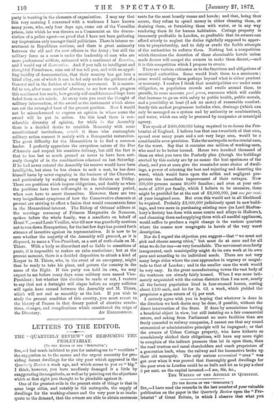LETTERS TO THE EDITOR.
THE QUARTERLY REVIEW" ON REHOUSING THE PROLETARIAT.
[To THE EDITOR OF THE " SPEOTATOR.”J Sur,—I feel much indebted to you for assisting me to " ventilate" the suggestion as to the means and the urgent necessity for pro- viding decent dwellings for the city poor which appeared in the Quarterly Review a week ago, and which seems to you so " big." I think, however, you have needlessly damaged it a little by exaggerating its magnitude, as well as by pointing out the objections which at first sight you thought to be pleadable against it.
One of the greatest evils in the present state of things is that in some large cities, and notably in thil metropolis, the supply of dwellings for the working-classes and the very poor is so inade- quate to the demand, that the owners are able to obtain enormous rents for the most beastly rooms and hovels ; and that, being thus secure, they refuse to spend money in either cleaning them, or draining them, or furnishing them with water, or in any way rendering them fit for human habitation. Cottage property is immensely profitable in London, so profitable that its owners can afford utterly to neglect the duties rightfully supposed to apper- tain to proprietorship, and to defy or evade the feeble attempts of the authorities to enforce them. Nothing but a competition which threatens the desertion of those abominable hovels unless made decent will compel the owners to make them decent,—and it is this competition which I propose to create.
There are various estimates as to the functions and obligations of municipal authorities. Some would limit them to a minimum ; some would enlarge them perhaps beyond what is either prudent or necessary. I confess I think that municipalities are under some obligation, as population crowds and swells around them, to- provide, in some measure pari passu, resources which will enable that increase to go on with safety to public health, public morals, and a possibility at least (I ask no more) of reasonable comfort. Surely this modest programme includes sites, drainage (which cam only be managed on a system and by authority or combination), and water, which can only be procured by companies or municipal agency.
You speak of £800,000,000 being required to re-house the Pro- letariat of England. I believe less that one-twentieth of that sum, spread over many years and a not very large area, would be a considerable over-provision. Take the metropolis as the crucial case, for the worst. Say that it contains one million of working-men, who need to be better housed. House two hundred thousand of them on what you term the Peabody plan (though the buildings erected by this society are by no means the best specimens of the class), and you at once give the remainder some choice of dwell- ings, a power of selecting the best and rejecting and deserting the worst, which would force upon the selfish and negligent pro- prietors the immediate improvement of their cottages. Now 200,000 persons means 40,000 families ; and even at your esti- mate of £200 per family, which I believe to be excessive, these might be provided for at the cost of £8,000,000, just one per cent. of your imagined sum. But even this would not in all likelihood be required. Probably £2,000,000 judiciously spent in new build- ings, and two more in purchasing existing ones (as Lord Shaftes- bury's Society has done with some courts and alleys in Holborn), and cleansing them and supplying them with all needful appliances,, would suffice to produce a rapid change in the various quarters where the masses now congregate in hovels of the very worst• description.
Nor do I regard the objection you suggest—than" we must not pick and choose among cities," but must do at once and for all what we do for one—as very formidable. The movement once fairly inaugurated, each municipality might do its own work at its own. pace and according to its individual needs. There are not very many large cities where the case approaches in urgency or magni- tude to that of London ; and in the smaller ones the work would be very easy. In the great manufacturing towns the vast body of the workmen are already fairly housed. When I was more inti- mately acquainted with the cotton districts than I am now, nearly all the factory population lived in four-roomed houses, costing about £100 each, and let for 2s. 6d. a week, which yielded the proprietor a gross return of 61 per cent.
I entirely agree with you in hoping that whatever is done in the direction we both desire may be done, if possible, without the direct intervention of the State. If done by associations having; a beneficial object in view, but still insisting on a fair commercial return, and asking from Parliament no more facilities than are- freely conceded to railway companies, I cannot see that any sound, economical or administrative principle will be impugned ; or that the owners of Urban Cottage property, who have hitherto so- scandalously shirked their obligations, will have any more right to complain of the indirect pressure thus let in upon them, than- the road trustees and canal shareholders and coach proprietors of a generation back, when the railway and the locomotive broke up• their old monopoly. The only serious economical "crux" was got over when it was proved that thoroughly good dwellings for- the poor even in London could be so built and let as to pay a clear- 5 per cent. on the capital invested.—I am, Sir, &c., THE WRITER OF THE ARTICLE IN QUESTION.


































 Previous page
Previous page